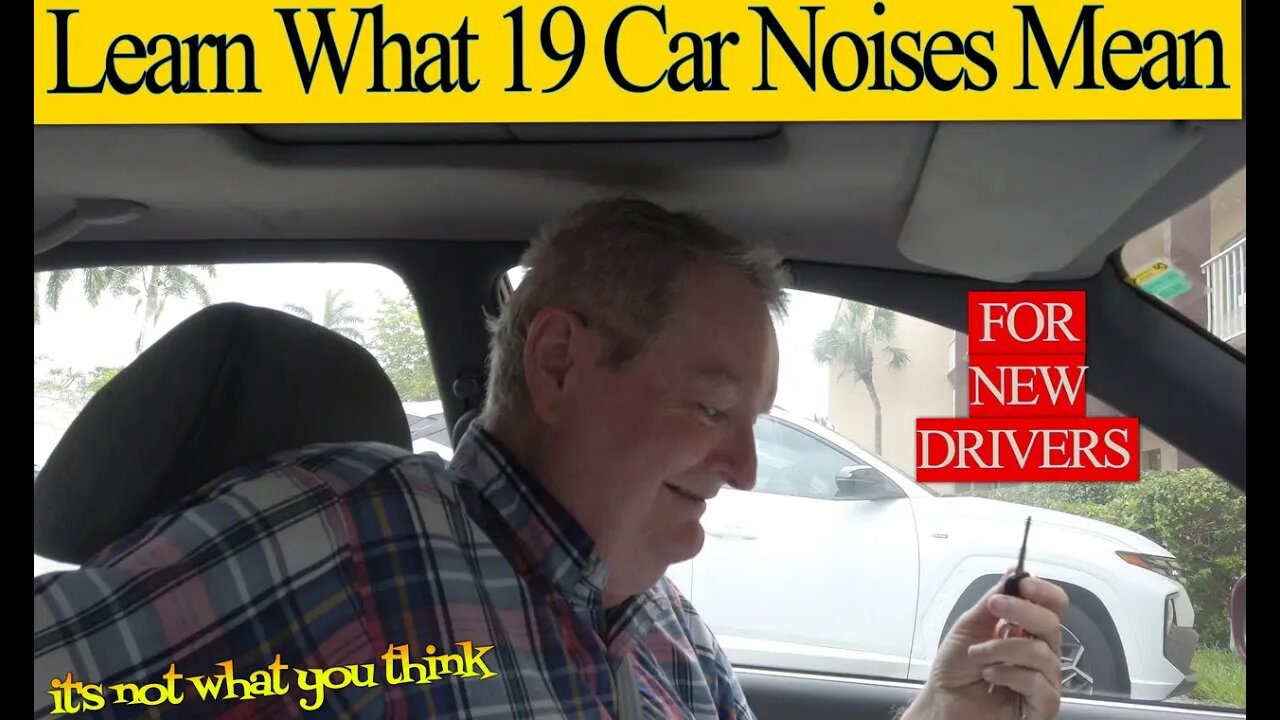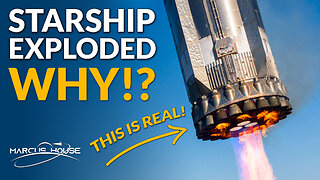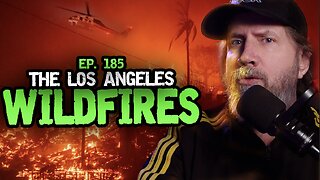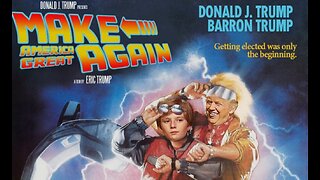Premium Only Content

19 Car Noises For New Drivers- Learn What Car Noises Mean
If your car is making noises it is trying to talk to you. Do you know what your car noises mean? I have been driving for over 50 years. Here are 19 bad car noises and my car noise translations based on personal experience.
If you are a new car driver this will help you diagnose possible car problems using car noises. If you are a more experienced and knowledgeable driver or a car mechanic or technician I welcome and appreciate any additional information you may leave in the comments to help inform the rest of us.
Common Causes of Car Noises and Their Solutions
Question: What would cause my car to make a clicking noise when I turned the key, but the engine does not start?
Answer: Possible causes include a weak battery, starter motor, or ignition system.
Screeching – this high pitched noise is due to the power steering belt in the car, which will need adjusting to resolve the issue.
Tapping, clattering, or knocking – this sound originates from the engine and is most like caused by the valve lifters or the crankshaft or bearings.
Light tapping you may need to adjust the valve clearances, heavy knocking, and maybe a crankshaft bearing issue.
Groans or Moans – when steering or turning? If your car has a hydraulic power steering system then the likely cause is a power steering pump.
Also-by low power steering fluid, a faulty power steering pump, or worn steering components.
Screeching, squealing, wailing –
Answer: Causes of this noise may include a worn serpentine belt, a faulty belt tensioner, or a problem with the alternator or power steering pump.
Hissing – from under the hood, indicating the escape of air from the air or fuel systems, or could indicate head gasket issues.
Also-a vacuum leak, a failing PCV valve, or a damaged intake manifold gasket.
Look for coolant leaks. Hissing when the car is turned off due to cold fluid leaking onto hot engine parts.
Rattling, pinging, or hammering – sound from the front when you accelerate or the car is under load is probably coming from misfiring pistons. : Potential causes include engine knocking, pre-ignition, worn engine bearings, or loose timing chain/belt.
Grinding or crunching – if noise occurs when changing gears either manually or automatically, it’s a problem with gears wearing or the gearbox synchronized, which allows for the easy shifting of gears or the clutch. Usually comes paired with high mileage.
: Possible causes include worn clutch (manual transmission), low transmission fluid (automatic transmission), or transmission problems.
Scraping or metallic screeching – brake pads are often designed to have a metal tag that creates a high-pitched noise to indicate the pads need changing.
Clunking – this slightly shocking sound when you brake is often accompanied by a lack of response from the pedal. The main cause? Usually, a sign that a caliper is either damaged or simply mounted incorrectly.
Whistling, scraping, rattling – don’t confuse it with a wheel bearing failure. May be a stone that’s caught between the brake disc and the cover and the noise is the vibration resonating through the entire system.
Knocking or clunking – when you go over potholes or bumps in the road? Suspension is usually the answer, and the cause is likely to be anything from bad ball joints, worn control arms
or faulty stabilizer pins. A simple bounce test can help confirm issues.
Common causes of this noise include worn suspension components, loose brake components, or drivetrain issues.
Loud bang – back-firing from the car? The likely cause is down to a poor mix between fuel and air which leads to explosions in the exhaust system or could be the catalytic converter.
Rasping or roaring sound – when accelerating is a problem with the car’s exhaust. Usually a simple fix. If this noise
is accompanied by a scraping sound then it’s likely a bracket has busted too and you are hearing the exhaust scrape.
: Possible causes include wheel bearing failure, tire issues, or problems with the exhaust system or drivetrain.
Howling, Whirring – usually a symptom of a problem with the differential. This complex system has a number of fatigue-prone parts and pinion preload, bad bearings, or worn gears are the most likely originators of the sound.
Car turning
Clunking or Clacking – listen for a sound similar to a train on the tracks. The cause? wear on the constant velocity joints (CV joints)
which can be found located at the end of the drive axles.
Possible causes include worn CV joints, damaged suspension components, or steering or drivetrain.
If you like my videos you can help me out by using the Amazon store link I added below. My Amazon store affiliate links
https://www.amazon.com/shop/robbshomemadelife/list/3IDHXEBDQ30FI?ref_=aip_sf_list_spv_ofs_mixed_d
Robb MoffettRobb's Homemade Life https://www.youtube.com/user/mrhulot101
-
 4:17:00
4:17:00
Tundra Tactical
11 hours ago $7.79 earnedSHOT SHOW 2025!!!!!! Whats Are We Looking Forward To Most
45.2K6 -
 25:33
25:33
marcushouse
1 day ago $12.46 earnedStarship Exploded! What Went Wrong? Flight Test 7 Explained
69.4K14 -
 1:00:50
1:00:50
Squaring The Circle, A Randall Carlson Podcast
19 hours ago#035 Cosmic Catastrophe In The Age Of Leo - Squaring The Circle: A Randall Carlson Podcast
44.2K21 -
 1:33:14
1:33:14
Jamie Kennedy
23 hours agoThe LA Fires...
32.3K7 -
 2:01:45
2:01:45
Quite Frankly
1 day ago"Inauguration Eve: Trump Time Travel Review" 1/17/25
32.9K33 -
 58:42
58:42
SGT Report
4 months agoYour REAL NEWS vs. CIA Mockingbird LIES -- Sam Anthony
160K95 -
 2:59
2:59
LimitlessAmbition
1 day ago $6.11 earnedPROVE THEM WRONG With This POWERFUL Motivation!
62.6K2 -
 8:31:37
8:31:37
G2G Gaming Channel
12 hours agoGive me my Helmet, Im going in!! #RumbleGaming
82.3K1 -
 4:45:11
4:45:11
MoFio23!
11 hours agoNintendo Switch It UP Saturdays with The Fellas: LIVE - Episode #3
52.1K6 -
 6:23:10
6:23:10
SquallRush
9 hours agoMarvel Rivals Collab
37.2K